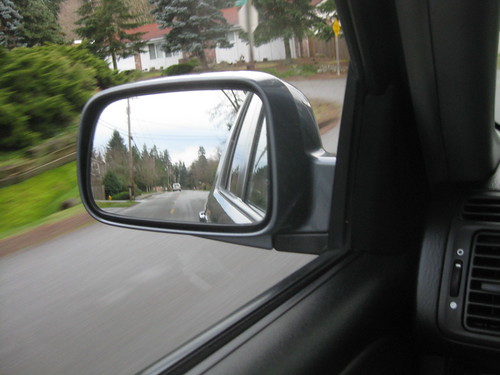Shortly after posting Metalearning and Learning Styles I glanced through the latest edition of Chief Learning Officer and came to an interesting quote, "Many CLOs believe podcasting is oversold because few people are auditory learners and its no different than cassettes or CDs from the past 15 years." You can read the article at, A Look at the Industry in 2010 (the quote is on the last page, top paragraph).
I find this quite interesting as CLOs should be the thought-leaders in our profession and yet they are following Marshall McLuhan's quote spot on:
The past went that-a-way. When faced with a totally new situation, we tend always to to attach ourselves to the objects, to the flavor of the recent past. We look at the present through a rear-view mirror. We march backwards into the future. - The Medium is the Massage.

Rather than looking backwards through a rear-view mirror, they should be looking at McLuhan's tetrad: four laws for looking at our culture and framed as questions:
- Enhancement or extend: what improved performance does it provide over the old
- Obsolescence: what does it make passe
- Retrieval: what new media is pulled from our cultural inventory
- Reversal: we tend to over-do the new until we run out of benefits and into detriments
Thus, the four questions that should be asked about podcasting are:
What does the technology extend or enhance?
It extends the benefits of dL (distance Learning) by providing the best medium for delivering lectures. See The effectiveness of m-learning in the form of podcast revision lectures in higher education and Turn on your iPod and learn. Note that lectures are an effective means for departing subject matter knowledge and is just as effective as discussions (Dunkin & Barnes, 1985; Kulik & Kulik, 1979; McKeachie, 1962; Ryan, 1969). In addition, the CLOs in the survey are guilty of placing too much stock in learning styles. The question is not "what media should we use for a learning style," but "what method of learning is best for the knowledge or skill that must be acquired.
Podcasts also enhances the device itself in that it is digital and a more versatile package than cassette or CD players.
What does it make obsolete?
Time spent in the classroom can now be spent on interactions and activities rather than listening.
Podcasting, part of the audio digital file family, is already eliminating the need to keep track of extra media, such as cassettes and CDs.
What is retrieved?
Subject matter knowledge.
What does the technology reverse into if it is over-extended?
It reverts into classroom training that is composed of nothing more than lectures. Thus while podcasts may be used strictly on their own in a few select instances, they should normally be used to train the subject knowledge required for a task, in addition to being used with classroom or elearning activities that will actually give the learners the skills to use the knowledge gained with the podcasts.
4 comments:
Interesting post, as usual.
Setting aside the whole business of Learning Styles being a bit of a smokescreen, podcasts do one thing exceptionally well for us 'auditory learners'.
And that is multiple perspectives and narratives. The multiple perspectives create tension and allow me to build up a sense of how I understand things and narratives facilitate mnemonic bundling. (Not to mention the potential for 'retelling', one of the most powerful learning experiences there are IMO).
I'm a recent convert to McLuhan and Tetrads. I'd previously written him off as a gnomic hippie. If you search YouTube for Tetrads, you'll see why. My mistake, though.
During the later part of his life McLuhan was dismayed that most of his peers dismissed him. However, I think he was one of those thinkers who was just ahead of his time.
Re: "It extends the benefits of dL (distance Learning) by providing the best medium for delivering lectures. See The effectiveness of m-learning in the form of podcast revision lectures in higher education and Turn on your iPod and learn"
Both articles point to the combined use of audio and video, not audio podcasts only.
I mention this because of personal and teaching experiences. Personally,I can not learn from audio podcasts. I have tried many times. Words alone make absolutely no sence to me. I do better, way better with video. I need to see the body language and facial expressions of the speaker to understand and stay focused on the words.
In my opinion, in a perfect world all audio podcasts would come with transcripts.
Also, have you seen http://www.cast.org/research/udl/index.html Universal Designs for Learning which calls for:
•Multiple means of representation, to give learners various ways of acquiring information and knowledge,
•Multiple means of action and expression, to provide learners alternatives for demonstrating what they know,
•Multiple means of engagement, to tap into learners' interests, offer appropriate challenges, and increase motivation.
Hi Jamie,
Note that I said it should be used on its own infreqently. Its best use is with other forms of learning. And while it can be used for videos, I stuck with lectures as that is the form of media that the CLOs campared it to. In addition, I see its best use for replacing classroom lectures as it allows the learners to repeat any or all of the lecture. This also has the additional benefit of saving the alloted classroom time for interactions and activities. Because lets face it, lectures will never disappear, thus lets put them in a medium that best delivers it.
Post a Comment